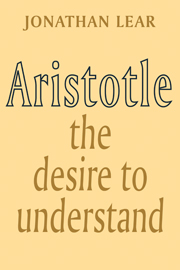6 - Understanding the broad structure of reality
Published online by Cambridge University Press: 04 August 2010
Summary
Man is not only a political animal. He also has within his breast the desire to understand. And there is a serious question as to how man can both fulfill his nature as a political animal and fully satisfy his innate desire to understand. The conflict is one which takes time to develop. For to a certain extent the desire to understand helps man to live the life of an active citizen. For man comes to understand that the ethical life within society is a way to achieve genuine human happiness; and when man comes to understand what happiness is, he is more likely to achieve it. However, if man pursues his desire to understand to the full he will find himself drawn outside the ethical life. It seems that it is man's nature to transcend his nature. Man is by nature a political animal, but he is also an animal who by nature desires to understand the world. And in coming to understand the world, he will leave the ethical life behind. His nature will take him beyond (or outside) his natural life as a political animal.
How are we to understand such a paradoxical conception? One way is to investigate the structure of theoretical understanding. For if we grasp what the desire to understand is a desire for, we may be able to see how satisfying the desire – achieving theoretical understanding – takes one outside the ethical life in society.
- Type
- Chapter
- Information
- AristotleThe Desire to Understand, pp. 209 - 320Publisher: Cambridge University PressPrint publication year: 1988
- 1
- Cited by



